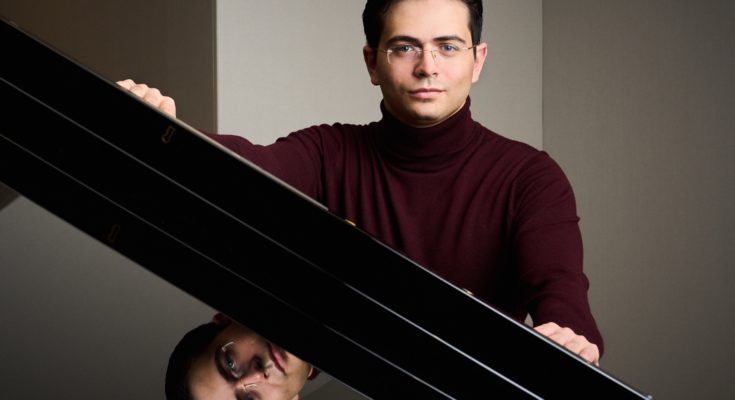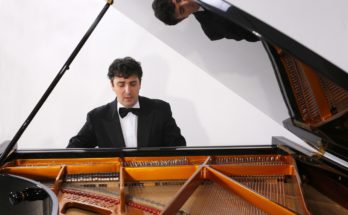This time PianoMe caught up with Ariel to talk about why he became a pianist and also about his current initiatives. We also spoke about his upcoming projects and he told us why he likes PianoMe’s idea.
PianoMe (PM): Dear Ariel, thank you very much for your time! It is a great pleasure for us that you are ready for an interview with PianoMe!
Ariel Lanyi (AL): Great to speak to you!
PM: That’s great, thank you! First of all, we would like to briefly introduce you to our readers, even though many of them probably already know who you are. You are a multi award winning pianist, who has developed his own style of playing. As a soloist you have appeared with orchestras in Israel, the UK, other European countries, Argentina and USA. Recital highlights include among others the deSingel Arts Centre in Antwerp and Salle Cortot in Paris. Can you please tell us first how you started getting into music, and as well, how you started playing piano, and what that’s been like for you?
AL: I was born into a household where music was always present. Although my parents are not musicians, music was played and I was immersed in it. Therefore, it was natural that I was going to want to make music myself. The piano was always my strongest instrument, but I was fortunate to have had a holistic musical education which also included studying the violin, composition, and jazz piano. Those other fields gave me a “bird’s eye view” of musicianship, not limited to the confines of the instrument.
PM: And who have been the most important influences on your musical life and career so far?
AL: There have, fortunately, been many. From my teachers to various colleagues I worked with and still work with, to certain musicians from the past whose recordings I devotedly listen to (such as Willem Mengelberg, Rachmaninoff, and others).
PM: Interesting! Tell me, what are your feelings and emotions when you perform in front of an audience? What emotions do you feel on stage?
AL: That depends very much on the occasion and on the work! However, I feel an enormous sense of gratitude every time I go on stage for being able, to the best of my abilities, to share music that means a great deal to me with an attentive public. During a performance, I often find myself entranced in the act.
PM: And what do you do offstage that provides inspiration on stage?
AL: That also depends on the occasion, but lately I have found myself thinking backstage of wanting to just “take a plunge” into the music. It somehow manages to mitigate the excess of nerves…
PM: When you take a set program on an extended tour, do you think your performances vary much as you play in the various cities?
AL: I think they do, even though the larger ideas about the music usually remain. Every performance should be a fresh start, striving to the ideal of the work being composed “in real time”. Hence new answers always transpire in the moment, and in addition, factors such as the piano and the hall always come into play.
PM: But I assume there also must be subtle differences between your practicing and preparation for a given concert and what actually comes out on stage?
AL: Oh, there are many! Much as we try to replicate the experience of playing on stage when we practice, it is ultimately impossible to do. Nothing can replicate the phenomenon of fifty, one hundred, five hundred, or one thousand people in one place, silent during a pause in the music, or before the music begins. That is the foundation upon which live music is built; and that cannot be imitated in any way. The same is true, by the way, of the experience of listening to recordings as opposed to being in a hall.
PM: How do you see the level of interest in classical music in Germany?
AL: German audiences are known to be extremely knowledgeable and engaged, something I find every time I play there. It’s a great pleasure to meet German audiences.
PM: And what do you feel needs to be done to grow classical music’s audiences?
AL: Many things can, and should, be done, of course, but in the process, I think we should make sure to not lose sight of the essence of classical music. We ought not to try and make it into something it is not. Let’s not rid ourselves of the mysterious and often inexplicable elements of what we do…
PM: As a musician, what is your definition of success?
AL: Being able to convey to an audience why certain works you think worthwhile are, indeed, worthwhile.
PM: By the way, as a musician yourself, you know that the journey is never sweet and easy. What advice would you give to someone hoping to build a career as a musician?
AL: Always be a musician first and an instrumentalist second. Remember that the great composers wrote for a variety of instruments, and take an interest in the wider musical repertoire, not only in works written for your instrument. It will make the whole journey infinitely more worthwhile and enjoyable. The knowledge that you are part of this bigger universe, and can contribute to it, will carry you through the inevitable challenges, of which there will be many.
PM: Thank you! One of your performance highlights from last season includes your debut with the Mahler Chamber Orchestra at the Grafenegg Festival performing Mozart’s Piano Concerto in A major. What were the challenges that present themselves to the pianist and the orchestra with regard to this performance?
AL: Mozart is always a challenging endeavor. His music is so transparent, it leaves you with nowhere to hide, and with nothing to cover up. Every gesture in Mozart is exposed, even more so in the A major concerto. Doing it with the Mahler Chamber Orchestra was an enormously fulfilling experience, as they have so much experience with this music that they truly intuit it. Also, this concerto really complemented their extraordinary wind section in all the dialogues between the piano and the wind instruments.
PM: Let’s speak about your CD recordings. The ninth album of the «Next Generation Mozart Soloists» series was released last July, featuring you among others. What significance did this recording have for you?
AL: This project with the Mozarteumorchester Salzburg was an enormous pleasure to undertake as the Mozart rondos, which I recorded, rarely get played. The A major rondo, which has a really unusual story – its manuscript was torn into bits which were auctioned off after Mozart’s death, meaning that parts of it were lost for well over a century before being put back together – is a real masterpiece of Mozart’s lyrical writing.
PM: Your latest album “Organ Reflections” seems to be a very innovative and extraordinary album. What is the story or inspiration behind your choice of composers and compositions?
AL: My upcoming album, Organ Reflections, features piano works inspired by the organ by Mozart, Franck, and Reger. I have long been fascinated by Reger’s Bach Variations and by Franck’s Prelude, aria, et final, and in recent seasons I have had the pleasure of taking these great works on tour. As I was working on them, I started noticing the obvious connection between these two rather disparate composers, which was the organ: both composers were, among many other things, eminent organists. The sound of the organ is omnipresent in both works, but especially in the Reger variations. Hence, I came to the conclusion that they would work together on an album, especially since they don’t get played too often. The Mozart Andante is a work I have loved for a very long time. It is so concise yet rich in textures, harmonies, and themes. The Prelude, aria, et final is Franck’s last work for the piano, and somewhat unusually for a composer so profoundly in touch with the darker side of things, it is optimistic and grateful. All three movements are in major, something we do not get in his other works. Few things move me as much as the conclusion to the Finale, where the different threads come together in accord and harmony, before folding gracefully into silence. We enter a different world with Reger’s Bach Variations – a colossal work, one where the piano truly transcends its own proportions and aspires to the sound-world and possibilities of the organ. Reger considered it to be his finest work, and not without reason: it is a work so rich in narrative, weaving different threads which come together in a towering fugue – one of the grandest endings ever written for the piano. It is fiendishly difficult, but worth every minute of the effort…!
PM: Very interesting! We are looking forward to the release of this album on May 23rd. Let’s speak about your current German engagements: you are going to give concerts in Munich, Monchengladbach and also attend the Festspiele Mecklenburg-Vorpommern. Can you please tell us more about these engagements?
AL: Coming to Germany is always a pleasure for me. Over the years, I have developed close friendships and partnerships there, so I always look forward to revisiting them and making new connections. I had the honor of being awarded the Rising Stars award for this year from the Initiativkreis Monchengladbach, where I visited in March in order to accept the award. On June 8th, I will be playing a recital in the unique Bergson Kunstkraftwerk, playing among other things Schumann’s Gesange der Frühe – his last published work for piano, and one of the most sublime things written for the instrument. And in August, I will be collaborating with a dear friend of mine and phenomenal violinist, Charlie Lovell-Jones at the Mecklenburg-Vorpommern festival. I eagerly look forward to all of these engagements.
PM: I’m really sorry, but I have to ask (laughing). Would you recommend PianoMe to musicians?
AL: I can wholeheartedly recommend PianoMe to musicians!
PM: Thank you! It shows us that we are on the right track! Finally, what are your aims for the future?
AL: My aims for the future are sharing more music dear to me with a large variety of audiences, and hopefully doing the composers justice.
PM: Dear Ariel, we thank you for the interview and wish you all the best!
AL: Thank you so much!
Copyright photo: @ Kaupo Kikkas




